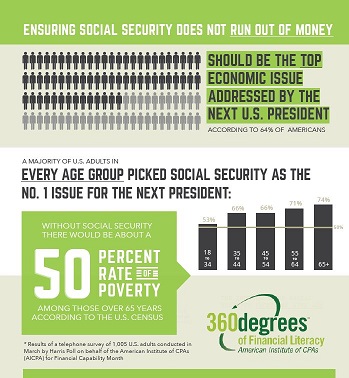Americans Say Social Security Solvency Should Be Next President’s Top Economic Priority
Majority in all age groups see Social Security as most important issue, according to new AICPA Survey of U.S. Adults
April 12, 2016
NEW YORK (Apr. 12, 2016) – Helping to insure that the Social Security system will not run out of money should be the top economic issue addressed by the next U.S. President, according to a new telephone survey of 1,005 U.S. adults conducted in March by Harris Poll on behalf of the American Institute of CPAs (AICPA) for Financial Capability Month. Almost two-in-three (64 percent) U.S. adults cited social security as the top issue, underscoring the importance of the program to Americans in retirement.
The largest majority of U.S. adults in each age group picked Social Security as one of the most important economic issues for the next President to address, with the percentages increasing as they aged. Three-in-four aged 65 and over (74 percent) picked it as the most important issue followed by 71 percent in the 55 to 64 age group, 66 percent in both the 45 to 54 and 35 to 44 age groups, and 53 percent in the 18 to 34 age group.
Social Security was followed by reducing the federal deficit (44 percent), decreasing unemployment (38 percent), reducing taxes (36 percent), and decreasing the international trade deficit (25 percent) as top economic issues the next president should address. While one-in-five (22 percent) cited keeping interest rates low, there was a small group (4 percent) who thought the next President should increase interest rates.
A recent National Council on Aging study found that 22 percent of married Social Security recipients and 47 percent of single Social Security recipients depend on Social Security for 90 percent of their income. The U.S. Census Bureau estimates that the poverty rate among men and women over 65 would be about 50 percent without Social Security. With 10,000 people turning 65 every day, these statistics underscore the importance of Social Security to current retirees and those about to retire.
“Our survey clearly demonstrates that people feel strongly about the solvency of Social Security and the potential impact on their own retirement security,” said Gregory Anton, CPA, CGMA, chair of the AICPA’s National CPA Financial Literacy Commission. “The earlier people start saving for retirement, and the more they contribute to their retirement accounts, the better financial shape they will be in. That way Social Security can supplement their retirement savings rather than serve as the sole component.”
The AICPA survey found that 44 percent of U.S. adults felt that their current economic well-being would be about the same as a result of the upcoming Presidential election. One-in-five (21 percent) felt that their economic well-being would be better and approximately the same proportion (19 percent) felt that their economic well-being would be worse after the election. Fifteen percent were not sure how the election would impact their economic well-being.
“While the outcome of elections have the potential to impact American’s economic situation –people need to understand that they themselves have the ability to make positive changes in their financial behavior,” added Anton. “The tools and resources on the AICPA’s 360 Degrees of Financial Literacy website empower people to understand their finances and take steps to improve their saving and spending habits to better position themselves for a comfortable retirement.”
Among the tools and resources on the AICPA’s 360 Degrees of Financial Literacy website are Social Security calculators to help determine what their benefits may be in retirement, and determine the impact of losing benefits upon their retirement income.
The AICPA’s National CPA Financial Literacy Commission offers the following tips to help Americans save for a more comfortable retirement.
- You can begin receiving Social Security retirement benefits as early as age 62. However, your benefit may be 25 to 35 percent higher if you wait until full retirement age of 66 or 67, depending on the year you were born.
- Social Security should be considered a component of your retirement plan, which can also include employer-sponsored retirement plans, a personal Roth IRA, and real estate holdings
- Retirement doesn’t have to be all-or-nothing affair. If you are not ready financially for full retirement, consider downshifting from full-time to part-time employment. This allows you to retain a source of income and remain active.
In addition to serving as Chair of the AICPA’s National CPA Financial Literacy Commission, Greg Anton is also is founder of the AICPA’s “What’s at Stake” initiative. What’s at Stake offers guidance on how the U.S. government’s financial statements can be used for greater understanding of the nation’s fiscal health.
For more information on the AICPA survey or to speak to a member of the AICPA’s National CPA Financial Literacy Commission, contact Marc Eiger at 212-596-6042, meiger@aicpa.org or James Schiavone at 212-596-6119, jschiavone@aicpa.org.

About AICPA Financial Literacy Initiatives
360 Degrees of Financial literacy (www.360finlit.org) is a national volunteer effort of the nation’s Certified Public Accountants to help Americans understand their personal finances and develop money management skills. The AICPA and Ad Council have developed the Feed the Pig program (Feed the Pig), a national and localized PSA campaign designed to improve financial literacy among Americans aged 25–34 by encouraging them to make savings a part of their daily lives.
